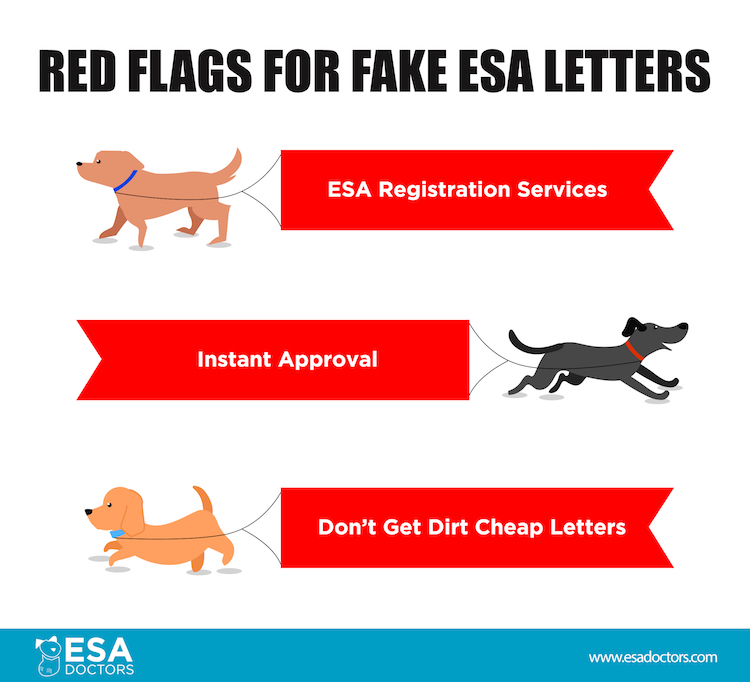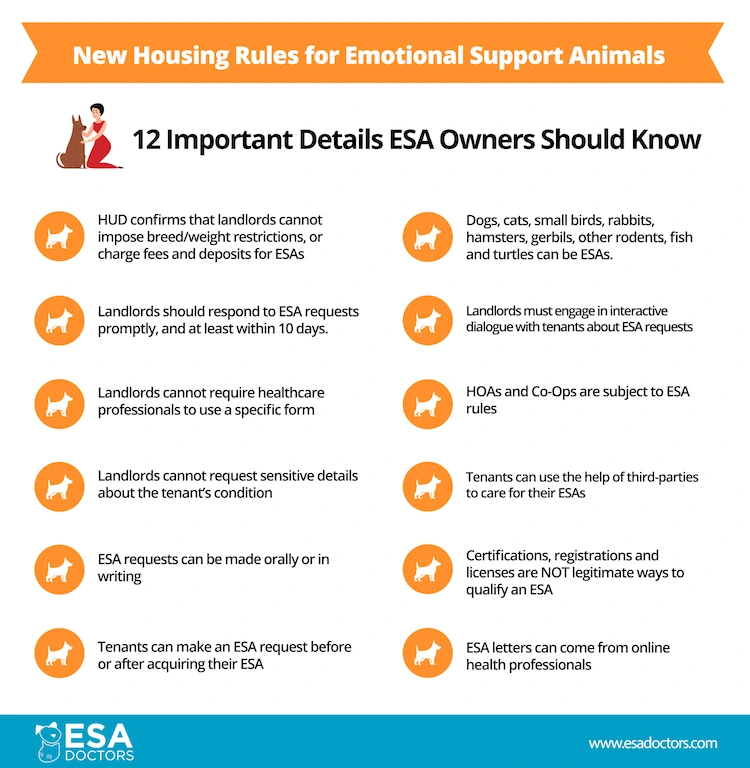Many individuals with an emotional or mental disability live with emotional support animals (ESA). These animal companions are more than just pets — caring for an emotional support animal gives people who struggle with their mental health a sense of purpose, and their presence is an essential part of managing their emotional or mental condition.
ESAs provide affection and companionship to individuals who are experiencing difficulties working through a traumatic experience or suffer from depression or anxiety. But when looking for housing, pets are not always welcome. Fortunately, a legitimate emotional support animal is protected by federal and state laws and is exempt from pet restrictions.
To make your emotional support animal official, you’ll need an ESA letter, issued by a licensed healthcare professional. The ESA letter explains your ESA is a critical part of your emotional and mental health.
ESA Doctors can connect you with a qualified healthcare provider who is licensed in your state. They can assess your mental state and, if approved, they will draft a legitimate ESA letter that states your emotional support animal is a necessary part of managing the symptoms of your disorder.
Defining Emotional Support Animals
Emotional Support Animals (ESA) are animal companions that help owners cope with their mental illnesses in addition to providing the typical joys of human-pet interaction. Caring for an ESA helps give people suffering from depression or bipolar disorder a sense of purpose and motivation. For example, individuals with depressive disorders may struggle to complete the simplest tasks of daily living — or even to get out of bed. Caring for an animal’s needs can help minimize these feelings and motivate to take better care of themselves.
Some people may use the terms “emotional support animal” and “service animal” interchangeably. However, service animals, like seizure alert dogs or guide dogs, are trained to perform certain tasks or to detect changes in their owner’s body chemistry and are covered under the Americans with Disabilities Act (ADA). On the other hand, ESAs do not need any special training. Their presence alone is what provides comfort and support to their owners.
If you suffer from a mental health issue and would like to qualify for an Emotional Support Animal online, we can help connect you to a licensed therapist licensed for your state in the link below.
Are You Struggling to Find Housing for Yourself and Your ESA?
If you’re concerned about finding housing for yourself and your emotional support animal, or if you’re trying to bring an ESA with you into a pet-free building, an official ESA letter may have you covered.
The U.S. Fair Housing Act (FHA) requires property managers to provide reasonable accommodation for tenants and their ESAs. Enforced by the U.S. Department of Housing and Urban Development (HUD), this act prohibits landlords from discriminating against members of protected classes, which include race, sexual orientation, religion, and disabilities.
The FHA defines disability as a person with a physical or mental impairment that substantially impacts one or more significant life activities.
ESA Doctors, est. 2015
Depression, anxiety disorders, and other diagnosed mental illnesses may be categorized as a protected class if the person is regarded as having the impairment or has medical records of their diagnosis. Therefore, landlords are required to make reasonable accommodations for tenants or potential tenants with a protected mental disorder. In most cases, allowing the tenant to have the ESA in their home would be considered a reasonable accommodation.
Furthermore, FHA protections exempt ESA owners from pet deposits and fees. And pet restrictions, such as size, type of animal, or breed, should be waived for individuals who present an ESA Letters for housing.
What Are ESA Letters?
An ESA letter states that a person has a mental health condition that benefits from the presence of an ESA. The letter states that an emotional support animal helps with the symptoms of your diagnosis.
An ESA letter is written by a licensed mental health professional (LMHP) and includes their license type and number and the date their license was issued. The LMHP will also sign and date the letter. Your ESA letter may include the specific animal you’ve chosen as your emotional support animal, although this is not required.
Who Can Write an ESA Letter?
A legitimate ESA letter must be written by a licensed mental health professional with an active license in the state of your residence. These can include several different kinds of practitioners:
- Licensed mental health professionals
- Primary care physician (PCP)
- Licensed general physician
You might see a primary care provider who also helps with your mental health concerns and ask them how an ESA could benefit you. However, just because you ask for one doesn’t automatically mean that you’ll receive one. A general practitioner may not be familiar with the benefits of emotional support animals, so if you truly want to pursue an ESA, you may need to speak with a specialist.
A licensed therapist can conduct an in-depth analysis of your mental health background and offer suggestions to manage the symptoms of your mental health condition. Qualified LMHPs include:
- Psychiatrists
- Psychologists
- Mental health counselors
- Clinical social workers
- Psychologists
If you’re currently seeing a mental health professional, you can inquire about having an emotional support animal as part of your overall treatment plan. If you’re struggling to find a qualified LMHP in your area, ESA Doctors can help.

How to Ask Your LMHP for an ESA Letter
When asking your doctor for an ESA letter, it’s important to understand what you’re asking for. Your LMHP will evaluate your condition and determine your needs to see if you would benefit from having an emotional support animal. If you’ve already have a relationship with your provider, this may be part of an ongoing conversation about managing your mental health concerns. However, if you’re seeing a new provider to obtain your ESA letter, you may need to prepare for the conversation.
First, explore the ESA laws and protections, as well as what pet therapy is and how it will benefit you. ESAs function differently from regular pets. You may want to review educational articles or videos about how animals can improve your life. Remember, you’re taking responsibility for the animal’s well-being and health, and you’ll likely be responsible for it for many years.
What Are the Qualifications for an ESA?
Emotional support animals aren’t necessary for every situation but can help an incredibly range of mental health issues. Some conditions that may qualify include:
- ADD/ADHD
- Anxiety
- Depression
- Motor skill disorders
Whether your emotional or mental disorder qualifies depends on the severity of the symptoms. Your condition must “substantially limit” a major life activity like work, sleep or the ability to socialize.
More About ESA Letters
ESA letters are valid for one year and should ideally be re-issued annually. If you’re in a long-term lease, your landlord may require you to submit a new emotional support animal letter each year. Furthermore, the letter writer must have a valid license, so if you’re seeing a new provider for the first time, check that they’re licensed for your state of residence. Otherwise, the letter may be invalid, and your landlord or property management company may have grounds to deny your ESA.
Do You Need Help Obtaining an ESA Letter?
If you have an emotional support animal and are having trouble finding housing, an ESA letter may help. ESA Doctors connects you with passionate licensed mental health providers who know all things ESA and will give you a fair and legitimate assessment of your condition.
Start your assessment today and live a better life with your emotional support animal.













Leave a Comment